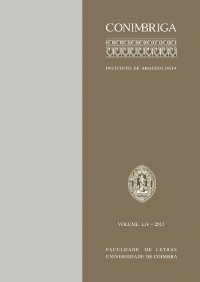Please use this identifier to cite or link to this item:
https://hdl.handle.net/10316.2/39126| Title: | A invisibilidade feminina: uma longa narrativa | Other Titles: | Women’s invisibility: a long narrative | Authors: | Melo, Ana Ávila | Keywords: | Invisibility in women;Gender and Women Studies;Feminisms;Prehistory;History of Archaeology;invisibilidade feminina;Estudos de Género;Feminismos;Arqueologia Pré-histórica;História da Arqueologia | Issue Date: | 2015 | Publisher: | Faculdade de Letras da Universidade de Coimbra | Abstract: | É longa a “ausência”, social e politicamente construída, das
mulheres na História. Esta falsa ausência não é mais do que uma
invisibilidade forçada do papel e da presença femininas como ser
ativo em todas as áreas da sociedade – económica, política, social,
cultural e simbólica/discursiva.
Num mundo em rápida mudança, poder-se-á argumentar que as
mulheres já têm um peso e importância significativos na sociedade,
mas será real? A visibilidade feminina dos nossos dias
corresponde, de facto, à sua dimensão económica, social, académica,
cultural e política?
Os Estudos Feministas e de Género, que se têm vindo a impor
e consolidar nas últimas décadas na Europa e na América,
continuam a denunciar a invisibilidade do papel científico das
Mulheres, em todas as áreas do conhecimento – a arqueologia
não é, portanto, excepção. Em Portugal, nos anos que se seguiram
ao 25 de Abril de 1974 e até ao dia de hoje, muitas foram as portas
que as mulheres abriram na sociedade portuguesa e a arqueologia foi uma delas. Reflitamos pois nestas questões, tendo em conta
a realidade histórica que as enquadrou e os condicionalismos da
era da globalização que se adapta e molda o panorama das nossas
próprias especificidades enquanto colectivo – Mulheres cientistas
e arqueólogas no dealbar deste novo milénio. The idea of a social and political absence of women in History comes from afar. However, this absence is, in fact, an ideological construction, due to the invisibility imposed on women, which has relegated them to a passive role in symbolic areas spanning from economy to the very body of discourse. In a continuously changing world, one might argue that women have now achieved a meaningful presence in all social, economic, artistic and scientific areas. And yet, a question remains to be answered: does the public visibility of women nowadays actually find a correspondence in the scientific, and academic fields? Furthermore, what is their actual impact in these fields? In Academia, Feminist, Women and Gender Studies have been making a major contribution in exposing and scrutinizing that invisibility in all areas of knowledge – Archeology being no exception. In the case of Portugal, starting in the years immediately following the Revolution of 1974, women have been increasingly taking part in all fields of research Archeology being one of the most important and intellectually challenging one. Hence the urgency of reflecting on how historical restrictions framing women’s work in Archeology have been fought and overcome. In the dawn of this new millennium and this era of globalization, it is crucial to understand these efforts in light of the collective of women archeologists. |
URI: | https://hdl.handle.net/10316.2/39126 | ISSN: | 1647-8657 (digital) 0084-9189 |
DOI: | 10.14195/1647-8657_54_3 | Rights: | open access |
| Appears in Collections: | Conimbriga |
Files in This Item:
| File | Description | Size | Format | |
|---|---|---|---|---|
| a_invisibilidade_feminina_-_uma_longa_narrativa.pdf | 8.42 MB | Adobe PDF |  |
Items in DSpace are protected by copyright, with all rights reserved, unless otherwise indicated.
